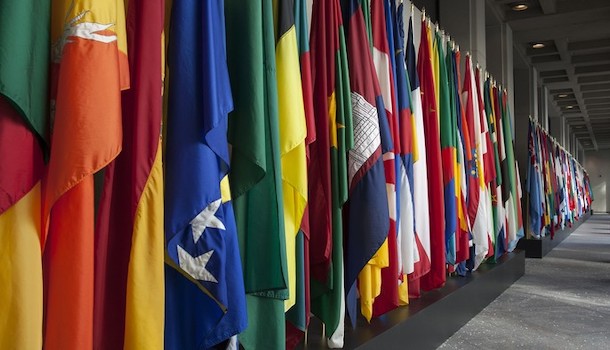Organisers: Minsk Dialogue Track-II Initiative
Partners: Konrad Adenauer Foundation and the Embassy of the Republic of Austria in the Republic of Belarus
Format: on-the-record seminar
Languages: Belarusian, Russian and English (with simultaneous interpretation)
Participants: 60-70 participants: academics and policy experts, acting and former diplomats, civil society representatives, students
Concept
In 1902, Joseph Chamberlain, then Britain’s Secretary of State for the Colonies, famously proclaimed: “The days are for great empires, and not for little states”. If anything, those words were ridiculed by the next century of human history. Not only did great empires fail and disintegrate, but also the number of independent states, small and large, has more than doubled ever since.
Yet, the meaning and power of sovereignty exercised by nation states today differ from their Westphalian origins. The realities of the modern world present multiple new challenges to the concept of sovereignty and complicate decision-making at the national level.
Only a decade ago, the main complication for sovereignty seemed to originate from globalisation. In other words, the opening of national borders inevitably led to new international rules and sovereignty “pooling”, which resulted in growing supranationalism. Moreover, new global non-state actors took their place around decision-making tables and, thus, limited the exclusive powers of the state.
However, recent years have seen new trends. To a degree, nation states are reasserting their indispensible centrality to international relations. At the same time, they remain highly interdependent and no country can act just on its own as if it were an isolated island.
These trends are taking the world into a qualitatively new era of competition and cooperation. As the global order is going through turbulent times, smaller states, as compared to great powers and regional hegemons, are naturally the first to experience heightened challenges and risks to their sovereignty.
Against this background, it becomes evident that in small states even the logic of sovereignty largely differs from that of bigger ones. Whereas for great powers, accepting supranational authority and other restrictions imposed by integration is a painful and often unacceptable compromise, which is seen as nothing less than the limitation of sovereignty, for a small state it might look the other way round. Given the latter’s inherent weaknesses, vulnerability to hard power politics and unpredictability sometimes present bigger limitations on their sovereignty than “pooling” it within international organisations. In fact, the “pooling” of some elements of sovereignty can be necessary to establish rules-based orders and is, therefore, a way for a small state to protect the foundations of its sovereignty. So, to paraphrase John Mearsheimer, they are not ready to surrender sovereignty but are fine with giving up some authority in exchange for better predictability.
With this in mind, the seminar will aim at advancing the theoretical and policy-oriented discussion about the concept of sovereignty in the modern world. It will explore the sources and limitations of sovereignty in today’s highly interdependent international relations; readdress the concepts of neutrality, alignment and hedging as strategies of sovereignty; and utilise the assumption that sovereignty is what states make of it in order to discuss ways of strengthening states’ sovereignty.
Programme
|
9.00-10.00 |
Registration |
|
10.00-10.30 |
Welcome remarks Aloisia Woergetter Ambassador Extraordinary and Plenipotentiary of the Republic of Austria to the Republic of Belarus Jakob Woellenstein Director Country Office Belarus, Konrad Adenauer Foundation Yauheni Preiherman Head, Minsk Dialogue Track-II Initiative |
|
10.30-12.00 |
Session 1. Legal, Political and Economic Sources and Limitations of Sovereignty in an Interdependent World Oleg Kravchenko Deputy Minister of Foreign Affairs of the Republic of Belarus Helmut Tichy Ambassador, Legal Adviser, Austrian Federal Ministry for Europe, Integration and Foreign Affairs Dr. Jan Philipp Woelbern Research Fellow at the Historical Division of the Konrad-Adenauer-Stiftung Dzmitry Kruk Research Associate, BEROC Dr. Kirill Entin Council, Court of the Eurasian Economic Union Moderator Jakob Woellenstein Director Country Office Belarus, Konrad Adenauer Foundation |
|
12.00-12.45 |
Light lunch |
|
12.45-14.30 |
Session 2. Sovereignty and Foreign and Security Policy: Neutrality, alignment and hedging as strategies of sovereignty Olga Voronovich International law expert, Belarus Dr. Benyamin Poghosyan Executive Director, Political Science Association of Armenia Dustin Dehez Managing Partner, Manatee Global Advisors, Germany Yauheni Preiherman Head, Minsk Dialogue Track-II Initiative Moderator Dzianis Melyantsou Programme Coordinator, Minsk Dialogue Track-II Initiative |
|
14.30-15.00 |
Coffee break |
|
15.00-16.30 |
Session 3. Diplomatic perspectives: Sovereignty is what states make of it? Dr. Valery Varanetsky Chairman, Standing Committee on International Affairs, House of Representatives of the National Assembly; former Deputy Minister of Foreign Affairs of Belarus Viorel Moşanu Ambassador Extraordinary and Plenipotentiary of Romania to the Republic of Belarus Dr. Claude Altermatt Head, Office of the Embassy of the Swiss Confederation in Minsk Moderator Prof. Viktar Shadurski Dean, Faculty of International Relations, Belarusian State University |
|
16.30-16.45 |
Concluding remarks |
|
18.30 |
Reception organised by the Embassy of Austria in the Republic of Belarus on the occasion of the state visit to Belarus by the Federal Chancellor of Austria Sebastian Kurz (Palace of the Republic, 1 Kastrychnitskaya square)
|


